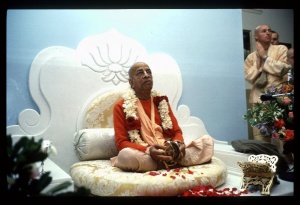SB 8.20.25-29

A.C. Bhaktivedanta Swami Prabhupada
TEXTS 25-29
- hṛdy aṅga dharmaṁ stanayor murārer
- ṛtaṁ ca satyaṁ ca manasy athendum
- śriyaṁ ca vakṣasy aravinda-hastāṁ
- kaṇṭhe ca sāmāni samasta-rephān
- indra-pradhānān amarān bhujeṣu
- tat-karṇayoḥ kakubho dyauś ca mūrdhni
- keśeṣu meghāñ chvasanaṁ nāsikāyām
- akṣṇoś ca sūryaṁ vadane ca vahnim
- vāṇyāṁ ca chandāṁsi rase jaleśaṁ
- bhruvor niṣedhaṁ ca vidhiṁ ca pakṣmasu
- ahaś ca rātriṁ ca parasya puṁso
- manyuṁ lalāṭe 'dhara eva lobham
- sparśe ca kāmaṁ nṛpa retasāmbhaḥ
- pṛṣṭhe tv adharmaṁ kramaṇeṣu yajñam
- chāyāsu mṛtyuṁ hasite ca māyāṁ
- tanū-ruheṣv oṣadhi-jātayaś ca
- nadīś ca nāḍīṣu śilā nakheṣu
- buddhāv ajaṁ deva-gaṇān ṛṣīṁś ca
- prāṇeṣu gātre sthira-jaṅgamāni
- sarvāṇi bhūtāni dadarśa vīraḥ
SYNONYMS
hṛdi — within the heart; aṅga — my dear King Parīkṣit; dharmam — religion; stanayoḥ — on the bosom; murāreḥ — of Murāri, the Supreme Personality of Godhead; ṛtam — very pleasing words; ca — also; satyam — truthfulness; ca — also; manasi — in the mind; atha — thereafter; indum — the moon; śriyam — the goddess of fortune; ca — also; vakṣasi — on the chest; aravinda-hastām — who always carries a lotus flower in her hand; kaṇṭhe — on the neck; ca — also; sāmāni — all the Vedas (Sāma, Yajur, Ṛg and Atharva); samasta-rephān — all sound vibrations; indra-pradhānān — headed by King Indra; amarān — all the demigods; bhujeṣu — on the arms; tat-karṇayoḥ — on the ears; kakubhaḥ — all the directions; dyauḥ ca — the luminaries; mūrdhni — on the top of the head; keśeṣu — within the hair; meghān — the clouds; śvasanam — breathing air; nāsikāyām — on the nostrils; akṣṇoḥ ca — in the eyes; sūryam — the sun; vadane — in the mouth; ca — also; vahnim — fire; vāṇyām — in His speech; ca — also; chandāṁsi — the Vedic hymns; rase — in the tongue; jala-īśam — the demigod of the water; bhruvoḥ — on the eyebrows; niṣedham — warnings; ca — also; vidhim — regulative principles; ca — also; pakṣmasu — in the eyelids; ahaḥ ca — daytime; rātrim — night; ca — also; parasya — of the supreme; puṁsaḥ — of the person; manyum — anger; lalāṭe — on the forehead; adhare — on the lips; eva — indeed; lobham — greed; sparśe — in His touch; ca — also; kāmam — lusty desires; nṛpa — O King; retasā — by semen; ambhaḥ — water; pṛṣṭhe — on the back; tu — but; adharmam — irreligion; kramaṇeṣu — in the wonderful activities; yajñam — fire sacrifice; chāyāsu — in the shadows; mṛtyum — death; hasite — in His smiling; ca — also; māyām — the illusory energy; tanū-ruheṣu — in the hair on the body; oṣadhi-jātayaḥ — all species of drugs, herbs and plants; ca — and; nadīḥ — the rivers; ca — also; nāḍīṣu — in the veins; śilāḥ — stones; nakheṣu — in the nails; buddhau — in the intelligence; ajam — Lord Brahmā; deva-gaṇān — the demigods; ṛṣīn ca — and the great sages; prāṇeṣu — in the senses; gātre — in the body; sthira-jaṅgamāni — moving and stationary; sarvāṇi — all of them; bhūtāni — living entities; dadarśa — saw; vīraḥ — Bali Mahārāja.
TRANSLATION
My dear King, on the heart of Lord Murāri he saw religion; on the chest, both pleasing words and truthfulness; in the mind, the moon; on the bosom, the goddess of fortune, with a lotus flower in her hand; on the neck, all the Vedas and all sound vibrations; on the arms, all the demigods, headed by King Indra; in both ears, all the directions; on the head, the upper planetary systems; on the hair, the clouds; in the nostrils, the wind; on the eyes, the sun; and in the mouth, fire. From His words came all the Vedic mantras, on His tongue was the demigod of water, Varuṇadeva, on His eyebrows were the regulative principles, and on His eyelids were day and night. [When His eyes were open it was daytime, and when they were closed it was night.] On His forehead was anger, and on His lips was greed. O King, in His touch were lusty desires, in His semen were all the waters, on His back was irreligion, and in His wonderful activities or steps was the fire of sacrifice. On His shadow was death, in His smile was the illusory energy, and on the hairs of His body were all the drugs and herbs. In His veins were all the rivers, on His nails were all the stones, in His intelligence were Lord Brahmā, the demigods and the great saintly persons, and throughout His entire body and senses were all living entities, moving and stationary. Bali Mahārāja thus saw everything in the gigantic body of the Lord.